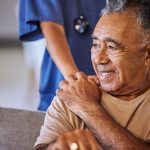-
October 27: The Week in Cancer News
Living alone may increase the risk of cancer death, and cervical cancer study results called ‘remarkable.’
by Kevin McLaughlin
-
Seasonal Shot Strategies
Researchers find that patients with cancer who are severely immunocompromised may benefit from a more frequent seasonal vaccine schedule.
by Sandra Gordon
-
October 20: The Week in Cancer News
Immunotherapy drug approved as pre- and post-surgery treatment for non-small cell lung cancer, and bladder cancer patients who respond to chemotherapy and immunotherapy can forgo surgery.
by Thomas Celona
-
Increasing Diversity in Clinical Trials
Researchers share approaches for improving participation among underrepresented groups at AACR conference.
by Thomas Celona
-
Planning for the Return Home After Surgery
Experts suggest patients prepare for home recovery before surgery to help maintain some control.
by Coeli Carr
-
October 13: The Week in Cancer News
Rising prevalence of non-melanoma skin cancer leads to more deaths across the globe, and siblings of cancer patients struggle to ask for help.
by Eric Fitzsimmons
-
Making Treatment Decisions
It’s not always clear what to do when cancer progresses. Abigail Johnston shares how she has approached treatment decisions since her metastatic breast cancer diagnosis in 2017.
by Abigail M. Johnston
-
October 6: The Week in Cancer News
Minority groups less likely to receive palliative care, and radiation oncology meeting focuses on shorter radiation courses.
by Marci A. Landsmann
-
Fixing Systems, Building Trust
The AACR Conference on the Science of Cancer Health Disparities in Racial/Ethnic Minorities and the Medically Underserved explores efforts needed to address inequities in care and outcomes.
by Eric Fitzsimmons
-
Accelerating and Improving Drug Discovery
Forum for patient advocates explores how researchers are working to develop cancer treatments in a quicker, more efficient manner.
by Thomas Celona
Cancer Talk
Lessons From 20 Years Living With Cancer
Multiple myeloma survivor Jonathan Gluck reflects on uncertainty, and the scientific progress that has kept him living with cancer for more than two decades.
by Eric Fitzsimmons
The Enduring Importance of Cancer Disparities ResearchOpening session from AACR conference highlights how perseverance and adversity have informed cancer disparities research over the years.
by Eric Fitzsimmons
Most Cancer Survivors Don’t Meet Healthy Diet GoalsDespite research linking fruits and vegetables to cancer survival, many people do not change their eating habits after diagnosis.
by Darlene Dobkowski
Many People Don’t Get Colonoscopy After Receiving Abnormal Blood TestsAbout half of people who receive abnormal results from colorectal cancer screening tests don’t follow up with a colonoscopy.
by Laura Gesualdi Gilmore














